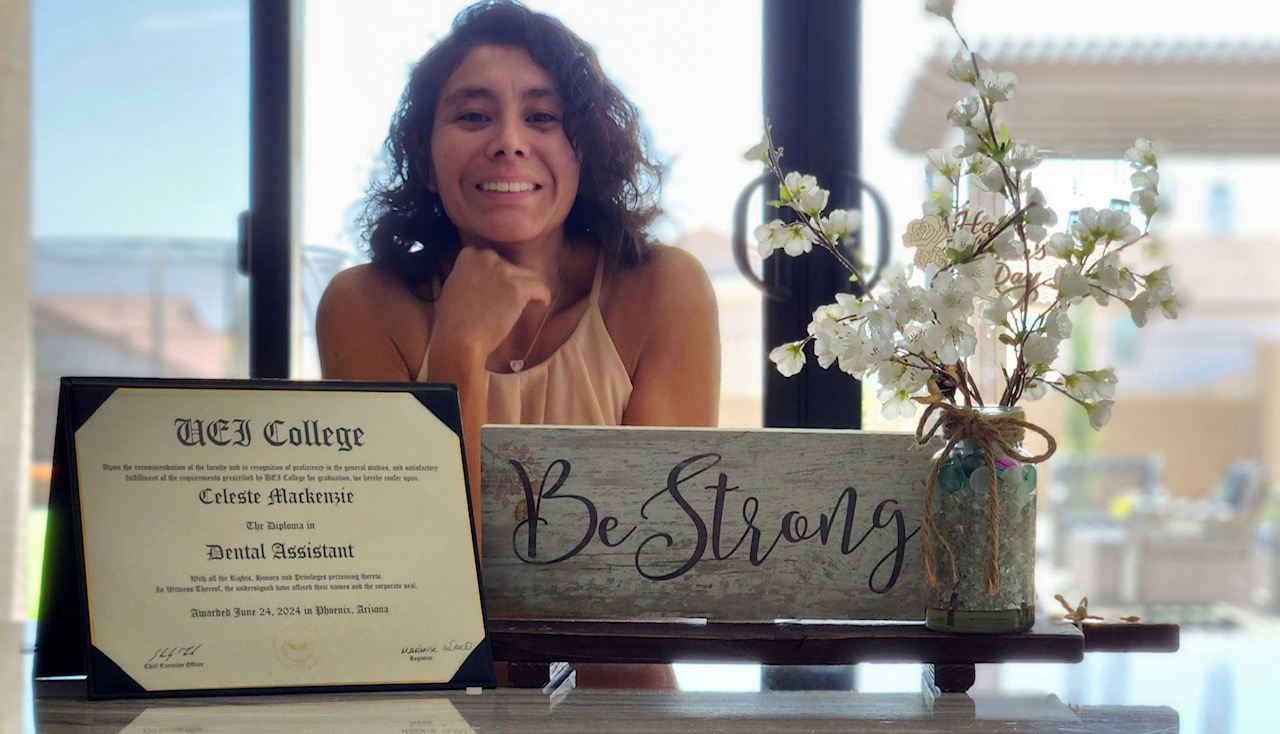Are Dental Assistants Allowed to Clean Teeth?
| Update: September 03, 2024
Dental assistants support dental hygienists and dentists in a dental facility with any tasks that helps the office run more smoothly. They help check patients in, schedule appointments, and verify insurance information, but they may also help with basic dental procedures. While it may not seem difficult to clean a person’s teeth, it takes a high level of skill and training to do the job properly. Cleaning teeth is outside the scope of practice for a dental assistant, but that doesn’t mean their role within an office is not important.
If you're interested in becoming a Dental Assistant, consider enrolling in UEI College's Dental Assistant Program! The Dental Assistant Program is short-term, meaning you can earn a Dental Assistant Diploma in as few as 10 Months!
Are Dental Assistants Allowed to Perform Cleanings?
No, dental assistants are not allowed to perform teeth cleanings. Cleaning teeth using the tools in a dental office requires a higher level of training that a dental assistant does not have. Performing cleanings is outside the scope of practice of dental assistants. Dental Assistants are not permitted to use dental drills. Therefore, they are not permitted to perform cleanings.
However, a dental assistant may be on hand to assist a dental hygienist or dentist with a cleaning. They may do this by handing the dentist or hygienist tools, providing them with equipment, and taking notes to add to a patient’s record. Dental assistants may also sanitize the chair following a patient’s visit and re-stock supplies before the next patient comes in.
Dental assistants do have the training to understand basic dental hygiene and maintain optimum oral health but performing a teeth cleaning requires scraping, polishing, and the use of tools that dental assistants do not have the training to perform.
Are Dental Assistants Allowed To Do Any Work on Teeth?
The exact tasks a dental assistant is allowed to perform vary by state. Dental assistants are permitted to do some non-invasive work on teeth but are not permitted to do any work with a dental pick or a drill.
Dental assistants are trained to perform the following tasks:
- Take impressions for study or retainers
- Maintain dental equipment
- Monitor a patient’s bleeding
- Remove sutures
- Mix dental materials
- Educate a patient on basic dental hygiene
- Sterilize equipment
- Provide pre and post-op instructions to patients
- Identify the correct size for orthodontic bands
- Monitor and record vital signs
- Use suction, irrigation, and drying tools to assist during a procedure
- Remove dressings
- Recognize medical and dental emergencies
Are Dental Assistants Allowed to Whiten Teeth?
In most states, dental assistants are not allowed to perform teeth whitening using bleaching agents and curing devices. Teeth whitening requires additional training and certification, which is something that Dental Assistants are not trained to perform.
Dental Hygienist vs Dental Assistants
When you visit a dentist’s office for a visit, you’ll see a variety of people working there. Let’s take a deeper look at each person’s role.
Dental Assistant
Dental assistants are in the office to greet patients and help them fill out any needed paperwork. They verify a patient’s insurance information and help answer the phone or emails. Once a patient is checked in, a dental assistant may be the one to take them to the dental chair and make sure they are comfortable before their exam. When the dentist comes in for an exam, a dental assistant may help with taking notes, handing tools, and positioning a patient. Following the exam or procedure, they may provide follow-up directions, help schedule the next appointment, and sanitize the equipment.
Dental Hygienist
A dental hygienist is a person you see during a routine appointment for preventative care. Dental Hygienists may take x-rays and update a patient’s chart, but their main focus is on cleaning a patient’s teeth. They scrape away any tough tartar or plaque and use tools to polish teeth and remove stains. They are also trained to notice any problems with a patient’s teeth that may require a dentist’s attention.
Dentist
A dentist visits a patient last after receiving information from the dental assistant or dental hygienist. They go over any notes, examine teeth and perform any necessary procedures to help repair damaged teeth or prevent further damage. They may come up with a treatment plan for tough cases or refer patients to other specialists for further treatment.
How to become a dental assistant?
Becoming a dental assistant does require training, but the process may be easier than you think. The minimum education requirement for a dental assistant is a high school diploma. Training through a trade college like UEI College will provide the quickest path to an entry-level position and can be completed in as few as ten months. UEI College's Dental Assistant program also includes an externship in the community, giving students the real-world experience they need to apply all that they have learned.
Basic training will prepare you for an entry-level position as a dental assistant and expose you to the different paths you may take within the field. Certifications and further training will help you to advance as a dental assistant and pick up new skills to help within a dental office.
Learn more about How to Become a Dental Assistant!
Should You Become a Dental Assistant?
If you have always been fascinated by the dental field, you should seriously consider becoming a dental assistant. Training to become a dental assistant is quick, and this entry-level position gives you a unique look inside a dental office. With training to help with administrative and clinical tasks, being a dental assistant can help you decide if a career in dental is a good fit for you.
A good dental assistant is able to multi-task, pay attention to details, and loves to help people achieve a beautiful smile. If that sounds like you, then begin your training today!
What Does a Day in the Life of a Dental Assistant Look Likes?
A day in the life of a dental assistant is diverse and interesting. While the exact tasks of a dental assistant depend on the state they live in and the office they work for, here is what a typical day of a dental assistant may look like:
Most dental assistants work typical business hours, so they would check in to the office in the morning. They may sit at the front desk and check any missed calls, emails, or mail for the office. The dental assistant may answer the phone and help patients schedule their appointments.
As patients check in, the dental assistant greets them and collects any new payment or insurance information.
When it is time for the patient’s appointment, the dental assistant may get them situated and comfortable before the dentist or hygienist comes in. They may update a patient’s medical records and take a patient’s vitals if necessary.
During the exam with a dentist, the dental assistant may be sitting nearby, adding notes to the patient’s record, handing the dentist tools, or handling the suction or water. They may also help with any basic tasks as assigned by the dentist, like taking impressions or applying topical fluoride.
Following the exam or treatment, the dental assistant may provide follow-up instructions to the patient and help schedule their next appointment. They also sanitize the chair and equipment and restock supplies before the next patient comes in.
In busier offices, dental assistants may be juggling more than one patient at a time or spending their time solely at the front desk or solely at the dentist’s side.
Enroll in UEI College's Dental Assistant Program
If you are considering beginning your career in the dental field, becoming a dental assistant is an excellent stepping-stone. The training will cover the basics of oral hygiene and dental procedures and gives hands-on opportunities to practice new skills. If you are looking for a rewarding career with plenty of opportunities to grow and continue learning, look no further than dental assisting.
The Dental Assisting program at UEI College can be completed in as few as ten months, and with the added support of our experienced staff and career services team, we help students find opportunities for employment as soon as they graduate.
Give us a call today to tour the campus and learn more about UEI College's Dental Assisting Program!





